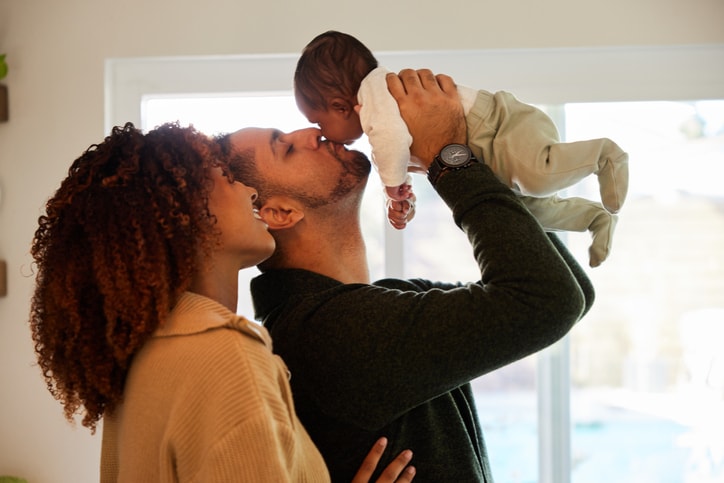In this article
Despite the proven benefits, parental leave in the United States is not a universal reality for all new parents. While the Family Medical Leave Act offers job-protected absence for some parents after the birth of a child or after an adoptive parent brings home a child, laws around leave are complicated at best and vary from state to state and employer.
New research published in the Lancet confirms that parental leave offers peace of mind, time to connect with a new child and allows time to heal after labor and delivery. Parents can take the time to find new routines and find a comfortable work-life balance, which benefits mental health, particularly for birthing parents.
Rebecca Minor, a licensed independent clinical social worker and Gender Specialist in private practice, confirms that a lack of parental leave negatively impacts mental and physical health. She says that the increased stress and anxiety around financial stability as well as the mental and physical exhaustion of being a new parent diminishes a person’s wellbeing and leads to burnout. This negatively impacts the ability to bond with a child.
She adds that the lack of time and energy available to spend with family and friends also strains relationships and can contribute to feelings of isolation and loneliness.
Overwhelmingly, though, and despite ongoing evidence of its benefits, parental leave is either nonexistent or not nearly enough.
Why new parents’ mental health must be talked about
In addition to the expected emotions related to being a new parent, hormones post-birth impact the emotional well-being of a parent. While parents hope they don’t experience postpartum anxiety or depression, it’s necessary to understand that bodies and brains go through a tremendous hormonal shift after giving birth. That shift can significantly impact mental health in negative ways.
Pregnant people and their support people should be aware of the signs that accompany the rollercoaster of emotions that follow the weeks after childbirth. Depending on the individual and if that person chooses to breast or chestfeed, postpartum hormones may not regulate to pre-pregnancy levels until six months after birth. These imbalances play a significant role in mental health.
You’ve likely heard the term “baby blues,” but often that term is used to excuse very real symptoms of a mental health crisis. The Centers for Disease Control and Prevention (CDC) note that 10-20% of new birthing parents are reported to have postpartum depression (PPD) and many others are never diagnosed. Race, identity and economic background factor into both. Queer parents may also face legal barriers as well as social stigma and discrimination that damage mental health.
Postpartum psychosis (PP) is not as common but is a mental health emergency that can cause paranoia, delusions, confusion and mania. PP is dangerous to both the birthing parent and people and children around them because the person experiencing it may cause themselves or others harm.
Early recognition and intervention can protect parents and children. Nicole Bolognini, a certified perinatal mental health professional and licensed clinical social worker encourages parents to seek mental health support at the earliest sign of distress.
How parental leave positively impacts mental health
Parental leave can reduce stress levels by giving parents the time and support they need to adjust to the new demands of parenthood; it also allows time to bond with their child, points out Lauren Cook-Mckay, a licensed marriage and family therapist.
“Having more time to spend with their newborn increases feelings of attachment and bonding which leads to improved mental health and reduced symptoms of postpartum depression,” says Cook-Mckay. This is because taking work out of the equation allows parents to focus on their family, new responsibilities and new roles that lead to a better work-life balance and overall improved mental health and well-being for both parents, adds Cook-Mckay.
Katie Kinville, preschool teacher and mom of one from Vermont, was able to take six weeks of paid disability leave and then used accumulated sick time for six more weeks at home with her newborn. Even though three months didn’t feel like enough time at home, Kinville felt lucky her husband was able to take the month of parental leave his job offered when she went back to work.
“Knowing I had income for three months and to be able to bond with my baby was huge for my mental well-being,” says Kinville. Having her husband taking care of their baby while she transitioned back to work was a relief as well.
“I meet with parents on a daily basis who struggle with their limited parental leave. Often, returning to work too soon can become a trigger of postpartum depression or anxiety.”
— Nicole Bolognini, certified perinatal mental health professional
The benefit of partners being present
Partners and new fathers also experience postpartum depression and often feel conflicted by wanting to both financially and emotionally support their family. When partners and fathers are also given parental leave, the whole family benefits.
“I meet with parents on a daily basis who struggle with their limited parental leave,” says Bolognini. “Often, returning to work too soon can become a trigger of postpartum depression or anxiety. Any parent can struggle with postpartum mood issues, not just the birthing parent.”
Cook-Mckay confirms that parental leave benefits all members of the immediate family. “Parental leave provides an opportunity for partners to provide emotional and practical support to one another, leading to improved mental health and well-being for both parents,” sshe notes. Parents are able to find a system that supports the needs of the family unit.
Christine Burke, registered nurse and mom of two from Bethlehem, Pennsylvania, was not working outside of the home at the time of the birth of her children, but having her husband home was instrumental to her and their family during the birth of their first child. Burke struggled with PPD and anxiety after the birth of her first child, but thankfully her husband, then in his medical residency, was given six weeks of parental leave.
Burke didn’t expect to be so overwhelmed with the feelings of depression in the early weeks of being a new parent. “Having my partner home with me not only allowed me to focus on my mental health with my physician but having him home also helped me heal physically since he could do much of the “heavy lifting” in those early weeks [post C-section],” she explains.
How a lack of parental leave can negatively impact mental health
Rebecca Claeys, mom of five from Spring Green, Wisconsin, was the sole wage earner when she had her daughter and fifth child. She was working as a floor nurse in a long-term care home, had minimal savings, and wasn’t offered any paid leave. The plan was to take six weeks of time off after a scheduled C-section, but two of those weeks were needed for mandatory bedrest before the surgery. Claeys was then faced with knowing she only had roughly three weeks to recover from surgery, manage a newborn, and incorporate a new child into the family.
“My mental health was not good,” says Claeys. “I couldn’t rest. I couldn’t enjoy my child. Bonding was hard, because I had to be so focused on if my family would be OK. I ended up getting cleared at my four-week checkup and was back on the floor exactly four weeks after surgery.”
She then had to juggle pumping at work (which required watching a video of her child breastfeeding in order to get her milk to drop), manage a stressful job and the finances at home. “My memories of that time are very general. I have pictures to remind me but struggle to remember that something actually happened.”
This is what Rebecca Minor signals as one of the failings of adequate parental leave. “A lack of parental leave can prevent parents from having adequate time to bond with their newborn, which can have long-lasting effects on the parent-child relationship,” says Rebecca Minor.
Jessie Lucas, mom of four from Albany, New York, was self-employed when pregnant with her second child. She was a personal trainer and yoga instructor, and income stopped when she wasn’t able to work at the end of her pregnancy and after giving birth. Her marriage ended within the year after her second child was born and she left without any support. She realizes that the lack of emotional and financial stability kept her, and ultimately her children, in a sense survival mode.
“While I was strong and did what needed to be done to get by, I was unable to tend to things like a calm mind and steady presence with my kids,” says Lucas. “Having that as our foundation set the trajectory for how our relationships developed over time. They are seeded in a lack of safety and security.”
“Taking care of yourself when you don’t have access to much or any leave requires leaning on community care, prioritizing self-care, releasing expectations, managing stress and anxiety and remembering that this won’t be this way forever.”
— Rebecca Minor, licensed independent clinical social worker
What experts recommend to get the most mental health benefit out of parental leave
While taking care of yourself after birthing a baby or bringing home an adopted child can feel daunting, Minor reminds parents that there are ways to prioritize your mental health, no matter the time you receive.
“Taking care of yourself when you don’t have access to much or any leave requires leaning on community care, prioritizing self-care, releasing expectations, managing stress and anxiety and remembering that this won’t be this way forever,” says Minor.
She recommends the following:
Build a support network.
Friends, family, and support groups go a long way. This is especially true if you are part of the LGBTQIA+ community. Leaning on chosen family is a must.
Prioritize self-care.
Take the time to find daily acts of joy through puzzles, baths and time with friends. Practice stress-management techniques. Meditation, yoga and deep breathing practices can help manage stress.
Set realistic expectations.
“Be realistic about what you can and cannot do, and don’t be afraid to ask for help when needed,” says Minor.
Consider peer or professional support.
If you recognize the stress and anxiety of being a new parent is becoming overwhelming, consider seeking peer support through a new parent group or professional help through counseling or therapy.
Find flexibility wherever you can
Even if you don’t have access to formal parental leave, there are options, says Candace Kotkin-De Carvalho, a licensed social worker with Absolute Awakenings from Morris Plains, New Jersey. “It’s important to talk with your employer about flexible working arrangements that can accommodate both you and your family needs, such as working from home or part-time hours,” she notes.
For some, taking unpaid or partially-paid leave and using sick time or vacation days may also be an option.
If you have a partner, Kotkin-De Carvalho suggests taking turns when it comes to being home with the baby so that one person is not taking all of the responsibility at home or taking all of the job security risk. If possible, she suggests asking family or friends to help out until you can find a permanent solution.
Kotkin-De Carvalho reminds parents to take advantage of parental leave by not being afraid to coordinate with their employers. Depending on the company’s policy, parents can take varying lengths and types of unpaid or paid leave for pregnancy, childbirth and adoption. Any and all time can be beneficial. Unsurprisingly, longer stretches of paid time-off after bringing home a baby is best for the mental health of parents and the ongoing relationships with family and friends.
Until universal parental leave is an option in the United States, it’s important to know you are not alone if you need help or feel overwhelmed by the newness and sometimes relentlessness of early parenthood. Talk to your partner, family or friends if you need support. There is no shame in admitting you are struggling with the mental health impacts related to welcoming a new child to the family. It’s not always easy to be a new parent, especially a working parent, so please use any and all resources to make the transition as healthy as possible.





